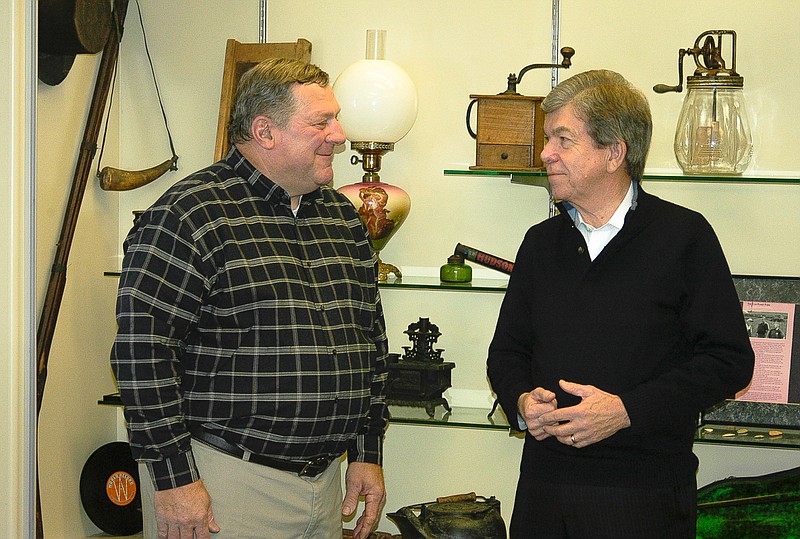Greeted by sixth generation landowner John Clay, Blunt checked out Clay family heirlooms, including the original 1828 land deed signed by President J.Q. Adams. When told that Congressman and Sen. Henry Clay was a relative of the Clay family, Blunt informed those present that Henry Clay's desk in the Senate Chamber is one of only two which are used by specific senators. While 98 of the desks may be used by any of the senators, the Henry Clay desk always goes to the senior senator from Kentucky. This year, since that is Sen. Majority Leader Mitch McConnell, junior Sen. Rand Paul sits at the Henry Clay desk.
The desk of Daniel Webster is the only other one with a designated user.
Among the executive over-reach and over-regulation items discussed were the regulations either in place or being sought regarding water, coal, other fuels, transportation, and food production.
Specific discussion was about the possible results of the effort to expand the term "navigable waters" to apply to any stream, or other water which runs into a navigable river, lake or sea, and the fact that the apparent intent is to increase energy costs by 80 percent.
The senator is proposing a bill to make every rule and regulation have an end date. Instead of regulations going on forever once they are in place, and more just being added on in perpetuity, every regulation would have to be defended to determine if it was doing what it was intended to do, or even if it is necessary at all.
It is estimated that $2 trillion a year is spent by people, landowners and businesses attempting to comply with regulations - regulations which keep multiplying, of which they are often not fully aware of and few seem to understand.
One problem pointed out during the meeting is that most of the U.S. population is several generations away from the farm and any knowledge or understanding of where the nation's food supply comes from.
John Clay asked, "What can we do now?"
"We can help people to reconnect with the knowledge of how important agriculture is to people," Blunt said.
After several questions were asked, Blunt said, "It's important that we get common sense back in the system."
He said high utility bills and transportation costs cause manufacturing to leave for areas were the costs is less. If they are lower, manufacturing will come back because of the quality of work.
"Trade is always good for agriculture," said Blunt. "We must rethink our sense of agriculture policy. People will buy what the U.S. produces, but we need to make it at a competitive prices."
He also pointed out that the major rivers in this country are important, and are underused for transportation.
He said the Corps of Engineers is supposed to, first, do flood control, and second, insure river transportation. "But you would never know that from the way they spend the money." He said much of the priority seems to be wildlife conservation and preservation of species designated as endangered to the detriment of agriculture operations and food production.
Sen. Blunt also commented on how duplication of the same work by different agencies is a real problem. "If one agency is helpful, three agencies must be three times as helpful."
Those present, in addition to Sen. Blunt and those with him (Ray Bozarth, Derek Coates and Charlie Barnes) were Larry and Linda Imhoff, Sharon and Art Schnuck, Heidi Eschenbrenner, Dennis Feezor, Chuck Massengill, Abe Rohrbach and Larry Rohrbach.

